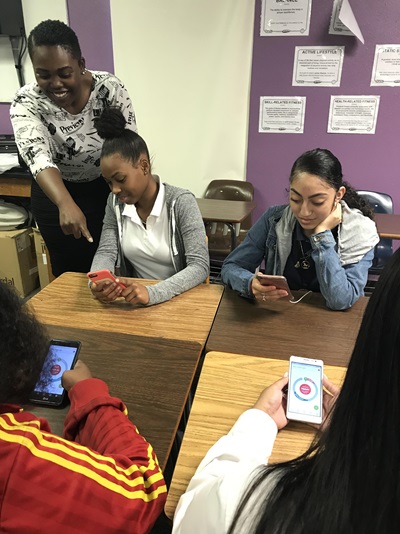Albert Schweitzer Fellows
Balancing Graduate School with Service: Schweitzer Fellows Making an Impact
For Justin Barringer, Ph.D. student in Religious Ethics and Chloe Griffen, M.A. student in Medical Anthropology, the chance to bring the skills and knowledge they’ve gained through their graduate programs and make an impact on the community is something that they couldn’t turn down.
 Barringer and Griffen are Albert Schweitzer Fellows, a program for local graduate and medical students that allows them the opportunity to launch 200-hour community service initiatives while receiving training in program development, leadership, and the social determinants of health (conditions in which people are born, grow, live, work, and age). Schweitzer Fellows take these projects on in addition to their other academic and research projects.
Barringer and Griffen are Albert Schweitzer Fellows, a program for local graduate and medical students that allows them the opportunity to launch 200-hour community service initiatives while receiving training in program development, leadership, and the social determinants of health (conditions in which people are born, grow, live, work, and age). Schweitzer Fellows take these projects on in addition to their other academic and research projects.
Barringer’s program, which is a diaper and feminine hygiene product bank, was a response to a need that he had seen in the community. “[My wife and I] started a diaper bank back at our home in Kentucky, and when we moved to Dallas we recognized a similar need, but we also noticed that, like diapers, feminine hygiene products are sometimes difficult to acquire for poor women, particularly those currently experiencing homelessness. In collaboration with one of my PhD colleagues, Grace Vargas, we started scheming about how we might collect and distribute these goods. Thankfully, around that same time the Schweitzer Fellowship opportunity came up for me and we were able to bring all the pieces together,” he explained.
Similarly, Griffen also recognized a need in Dallas, and chose to use her academic training to bring important resources to the community. Inspired by her experience as a high school biology instructor, Griffen seeks to help teenage girls in Dallas take control of their health, developing a program to that trains them in tracking their menstrual cycles and providing workshops on health.
“The inspiration for this particular project is the students themselves! There is a need for teaching methods that go beyond the state standards. This program offers students an opportunity to obtain a well-rounded understanding of their bodies in a non-traditional course design that incorporates state-mandated portions of curriculum,” she explained.
Griffen hopes that her project will serve as a training ground for her long-term goal of becoming a physician and serving communities in need, while giving her the opportunity to put her academic interests to good use. “I hope this experience strengthens my abilities to serve others and solve problems using ethnographic research and progressive instructional strategies. I also hope this project gives me practice in finding creative solutions and answers for the problems and questions of the underserved communities that I envision serving as a doctor.”
Through her project, she also hopes that the students that she works with this year and in years to come will use the information that they gain as a jumping-off point to take a more proactive role in their health. “By the end of the year I would like as many of the participants as possible to receive a free physical/wellness check-up from the community clinic and I would like to have a solid plan in place for continuing the project in the following academic year,” she elaborated.
Ultimately, Barringer has big plans for the long-term future of his project, but he also hopes that it will allow for a more personal impact as well. “My hope is that this project will only be the start of a greater effort by our church and a number of local nonprofit organizations to serve our area of east Dallas. […] By the end of my Schweitzer Fellowship year I think it is reasonable to estimate that we will be serving around 100 families a month with diapers, which would mean we might be distributing 100,000 diapers a year. Likewise, as we grow new partnerships with nonprofit organizations focused on serving poor and homeless women we aspire to provide at least 50 women with feminine hygiene products each month. My primary desire for this project, however, is that friendships will form across socio-economic, racial/ethnic, and generational lines in our neighborhood as people meet one another in these outreach and community spaces.”
To learn more about the Schweitzer Fellowship, email Courtney Roy, Program Director, at caroy@smu.edu